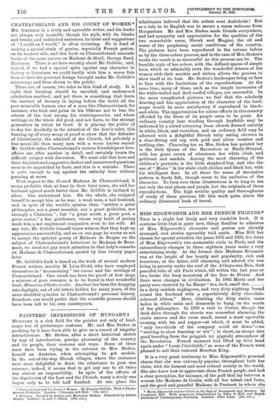CHATEAITBRIAND AND HIS COURT OF WOMEN.* Ma. GRIBBLE is a
lively and agreeable writer, and his books are always very readable, though his style, with its blanks and breaks and unfinished sentences, its hints and suggestions of "I could an I would," is often irritating. He is fond of making a special study of genius, especially French genius, on its weakest side, and this book on Chateaubriand succeeds books of the same nature on Madame de Stael, George Sand, Rousseau. There is no hero-worship about Mr. Gribble ; and, indeed, if we had a special spite against any character in history or literature, we could hardly wish him a worse fate than to have his personal doings brought under Mr. Gribble's microscope and thus shown to the public.
There are, of course, two sides to this kind of study. It is right that humbug should be unveiled, and undeserved admiration snubbed ; and yet there is something that hurts the instinct of decency in laying before the world all the poor miserable human sins of a man like Chateaubriand, for instance, who took real pains in his lifetime not to lose the esteem of the best among his contemporaries, and whose writings on the whole did good, and not harm, to the strange generation in which he lived. It is placing the public of to-day too decidedly in the situation of the hero's valet, this hunting up of every scrap of proof to show that the defender of Christianity, the admired of the Church, led privately a less moral life than many men with a worse known record. Mr. Gribble takes Chateaubriand's various friendships or love- affairs one after another in detail, and certainly treats the difficult subject with discretion. We must add that here and there his hints and suggestive dashes and unanswered questions seem to be unjustified by facts, and this is a mistake. There is quite enough to say against the unlucky hero without guessing at more.
With regard to the ill-used Madame de Chateaubriand, it seems probable that, at least in their later years, she and her husband agreed much better than Mr. Gribble is inclined to allow. She understood him. On the whole, she resigned herself to accept him as he was : a weak man, a bad husband, and, in spite of the world's opinion then, "neither a great philosopher, nor a great moralist, nor a great politician, nor strongly a Christian "; but "a great artist, a great poet, a great orator," a fine gentleman, whose very habit of posing made him a not unpleasant companion even to his wife. At any rate, Mr. Gribble himself bears witness that they kept up appearances successfully, and as on one page he warns us not to accept the spiteful gossip of Madame de Boigne on the subject of Chateaubriand's behaviour to Madame de Beau- mont, we need not pay much attention to that lady's remarks on Madame de Chateaubriand, quoted by him twenty pages later.
Mr. Gribble's book is based on the work of several modern French writers, notably M. Leon Seche, who have employed themselves in "documenting" the career and the writings of Chateaubriand. One result has been the proof of how large a mixture of pure romance is to be found in that wonderful book, Memoires d'Outre-tarabe. Another has been the dragging into daylight, out of old letters hidden for many years, of the more doubtful episodes in Chateaubriand's personal history. Somehow, one would prefer that the scientific process should have been left to his own countrymen.






















































 Previous page
Previous page